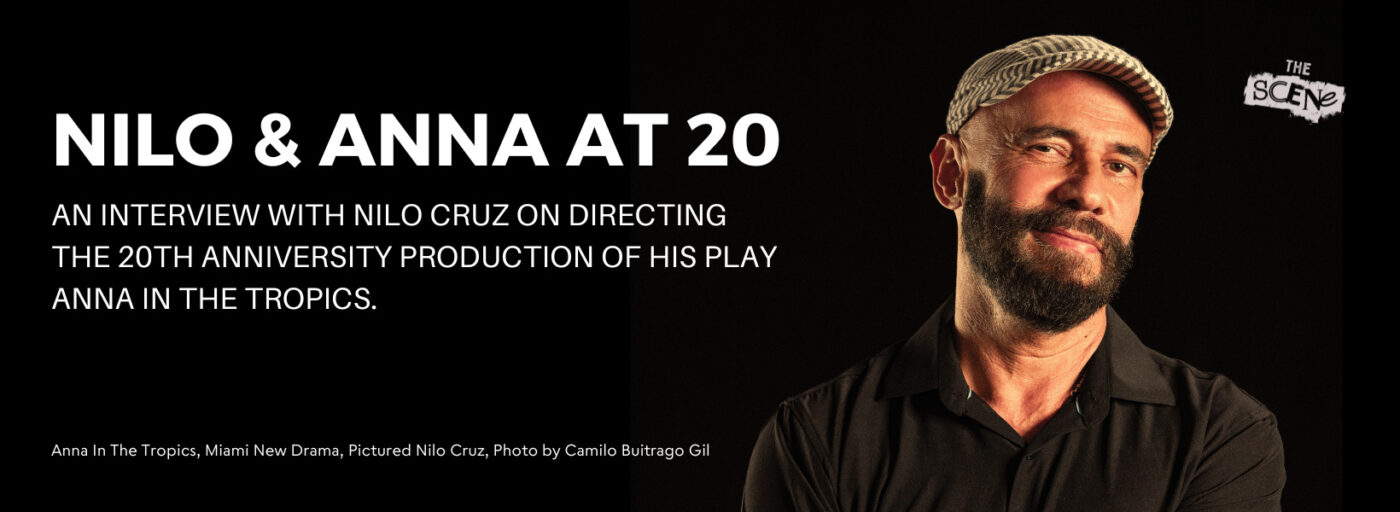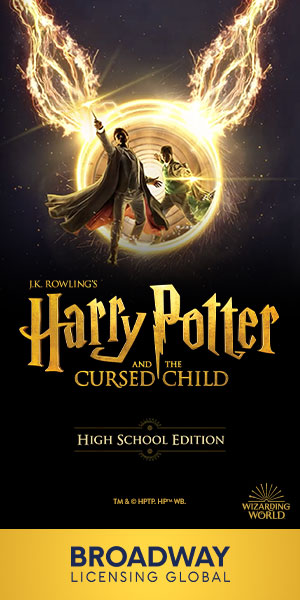Nilo Cruz is a Cuban American playwright, best known for his works that explore themes of love, loss, and the immigrant experience. He was born in Matanzas, Cuba in 1960 and came to the United States with his family when he was 12 years old. Cruz began his career as a playwright in the 1980’s and has since become one of the most prominent voices in American theater.
Cruz most recently directed the 20th Anniversary production of his play ANNA IN THE TROPICS, currently running at Miami New Drama, in Miami Beach Florida. ANNA IN THE TROPICS takes place in a Cuban American cigar factory in Tampa, Florida, and tells the story of a group of immigrants who bond over their shared love of literature, specifically “Anna Karenina.” The play explores themes of love, family, and the immigrant experience, and it earned Cruz the Pulitzer Prize for Drama in 2003.
Cruz spoke to The Scene from his home in Miami. This interview has been edited for length and clarity.
THE SCENE: How did you discover theater?
NILO CRUZ: I’ve always had inclinations towards the theater, but I think I really discovered theater through Shakespeare. We read Shakespeare in junior high, and I thought to myself, I want to live in this world, I want to immerse myself in this world of language. I immediately became enamored of this work and that was my entry into the world of theater. Somewhere along the way I sort of veered off in another direction, but eventually I came back to the fact that I wanted to be part of the theater.
THE SCENE: So, when did you decide you wanted to work in the theatre?
NILO CRUZ: I remember distinctly that it just occurred to me one day that I wanted to go to the theater. I went to see a play at our regional theater in Miami, it happened to be an English play called THE DRESSER.
THE SCENE: By Richard Harwood. That’s a great play.
NILO CRUZ: And I loved the production, loved everything about it. And the next day I just completely surrendered to theater and started taking classes again, mind you several years had passed between my initial epiphany with Shakespeare and the one I had that evening. That was when I decided to devote myself to theater and start studying.
THE SCENE: I think a lot of us who work in theatre have had a similar moment where we realize this is the path we need to be on, this is our journey.
NILO CRUZ: Yeah, but you have to be ready for it. You know what I’m saying? Because if you’re not ready for it, if you’re not willing to commit, body and soul. Then it’s not worth it.
THE SCENE: I really love what you said about surrendering. When you fall in love with the theater, it’s not even like an active commitment, it’s like the muse is larger than you and you must surrender yourself to it. Do you have a favorite Shakespeare play?
NILO CRUZ: I love HAMLET. I got to work on HAMLET because I translated the play from English to Spanish. So, I really got to live in that language and the mechanics of the words. So, I love HAMLET and of course I love TWELFTH NIGHT as well. But I would say HAMLET is just a play that I adore.
THE SCENE: Would you like to direct it?
NILO CRUZ: Yes, I did this translation adaptation for a theater in Florida, but I did not direct it. And of course, I would love to get my hands on it.
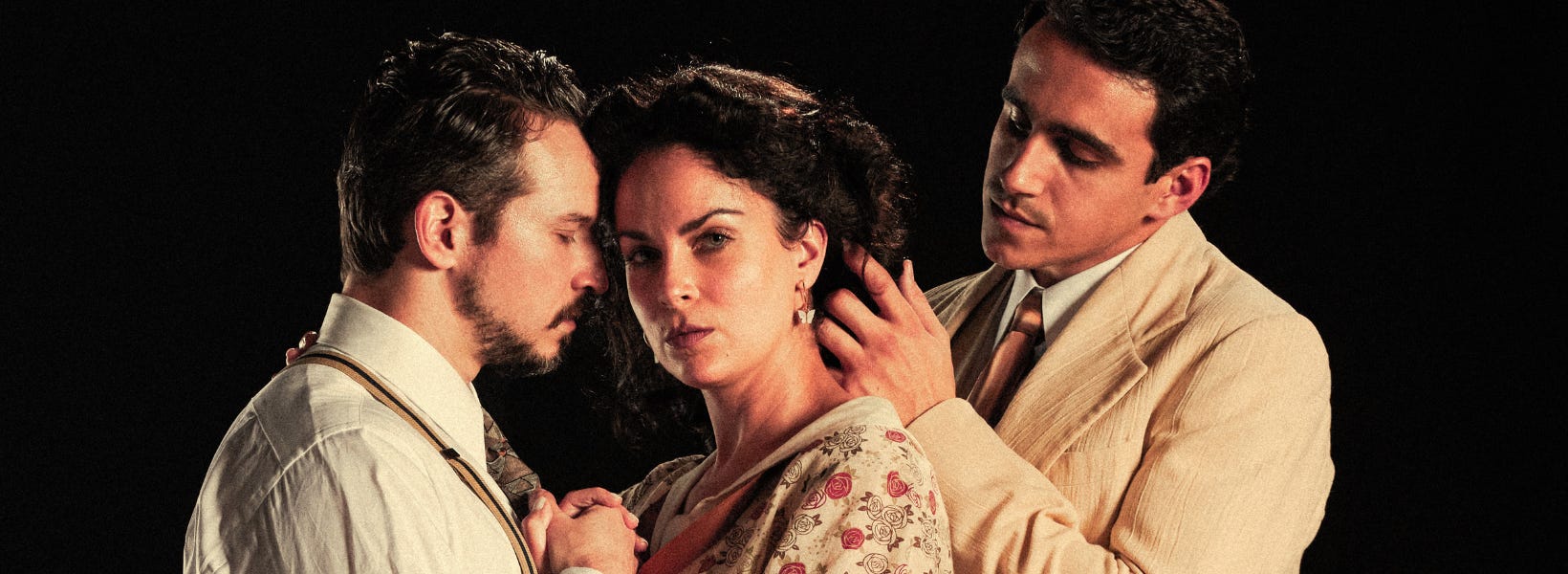
Anna In The Tropics, Miami New Drama, Pictured L-R, Brandon Espinoza, Hannia Guillen, Gabriell Salgado, Photo by Camilo Buitrago Gil
THE SCENE: Speaking of directing, you just opened and directed the 20th anniversary production of your play ANNA IN THE TROPICS, what’s it like to revisit the show after 20 years?
NILO CRUZ: Well, for me it’s like looking at it for the first time. That’s the way that I like to work, writing, directing, anything related to theater, to me it’s all about discovery. It’s all about exploring the text with this ensemble of actors and seeing what they bring to the table. I help guide them of course, but also work to not take away from their instinct when it comes to developing their character, so again, it’s just looking at it with fresh eyes, as if I hadn’t written it.
THE SCENE: Is it hard to separate the two?
NILO CRUZ: No, I think it’s a different dynamic. I think being a director is very different than actually writing a play. I think writing a play is a more internal process and directing tends to be a little bit more external. Being a director, you have to wear many hats. In some ways you have to be a psychologist because the process for actors is a very vulnerable one and you have to be there to support that. At least that’s the kind of director that I am, I don’t really like to dictate, even when I start blocking the piece, I don’t tell actors move there, move here, I see what the actor brings to the moment on the stage and then we try to fill in moments going deeper and deeper and deeper, that’s the way I like to work. You would think that being a writer I would like to spend more time doing table work. Absolutely not. I find that tablework is something that is helpful for a moment, but then once you stand up on your feet, it all goes to waste. I immediately start working with the play, with the actor being on the stage or in a rehearsal room, but the actor is up on his or her feet. That’s what I’m interested in.
THE SCENE: That’s fascinating. Is it a challenge when you’re working on a new piece and really hearing it the first few times?
NILO CRUZ: Even with a new play I don’t like to do a lot of table work- unless it’s the first draft and I’m just doing the reading.
THE SCENE: That’s different.
NILO CRUZ: I like to explore the play this way. The actors might have their scripts in their hands, but I like the process of creating an image and exploring the moment but through the body of the characters of the actors.
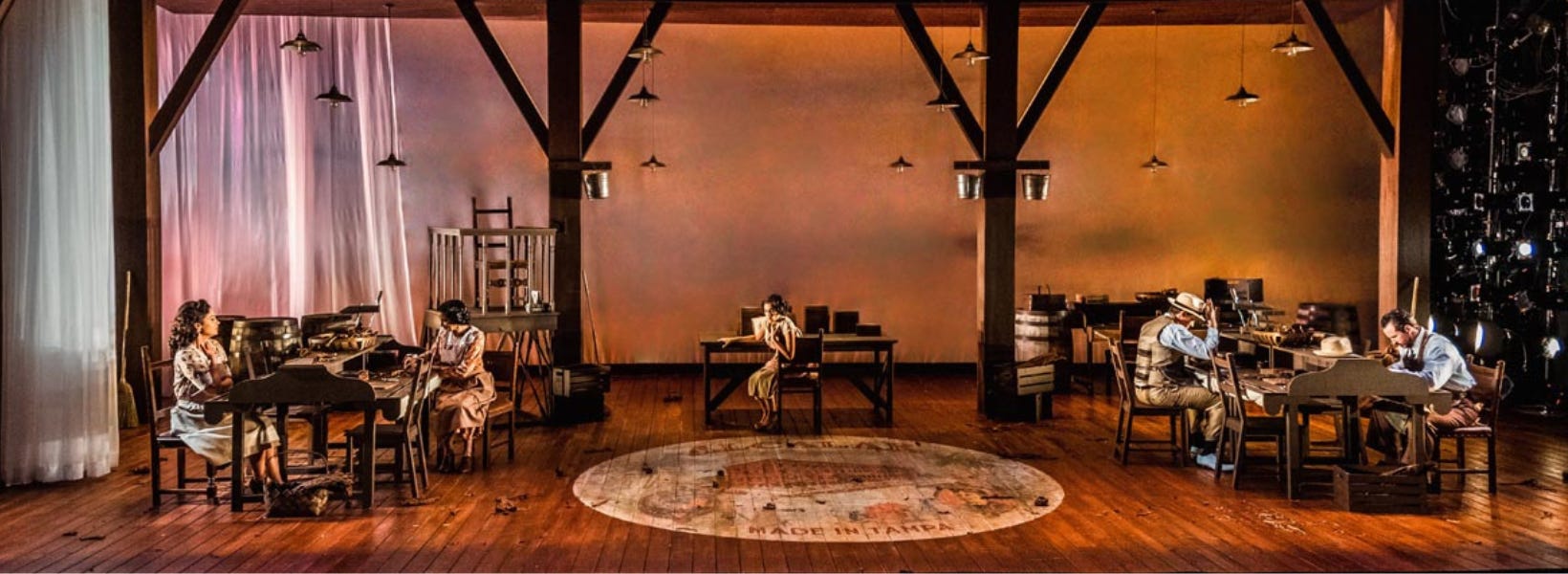
Anna In the Tropics, Miami New Drama, Pictured L-R Hannia Guillen, Saundra Santiago, Andrea Ferro, Daniel Capote, Brandon Espinoza, Photo by Andres-Manner
THE SCENE: You’ve taught playwriting at Brown, Iowa, and Yale Universities, based on what you just said, how do you teach playwriting?
NILO CRUZ: I don’t teach playwriting through a kind of a formula. It’s not just exposition, conflict, resolution, you need to have those things of course, but I’m interested in a longer process and interested in characters more than anything. I find that if you have a really good sense of your characters, somehow, you’ll be able to come up with a storyline. Writing is about doing a series of sketches, this means writing, doing scene work, re-writing scenes, and then eventually the process informs the actual play to be written. For me, writing for the theater is a lot of exploration to have a sense of the world that I’m writing about. It’s not unlike what painters do. Painters usually do a series of sketches before they enter the canvas, and that’s exactly what I like to do as a writer to explore the subject matter but through the actual craft of playwriting or writing scenes, and therefore if I get to use some of the material that I use for exploration, great, if not, that’s OK, I found different things about the character and was able to see the character in a new light and whether that works. Again if I use it or not, it doesn’t matter, because it’s about getting into the world that I’m writing about and that’s through the writing process, so I don’t teach a formula because there’s no one way to write a play.
THE SCENE: That’s very true!
NILO CRUZ: Learning structure is about reading plays, and students need to read plays. I chose different plays from different authors, and we discussed them, but the structure is about the approach of the writer, and that’s the way that I like to teach structure, not unlike the way that painters teach, especially in the old days that’s how the masters would learn to paint.
THE SCENE: Speaking of great masters, who are your favorite playwright masters?
CRUZ: Chekhov and Tennessee Williams…I like Federico García Lorca very much too. There’s another writer that I really, really like, a French writer named Jean-Luc Lagarce. I directed one of his pieces here in Miami called THE HISTORY OF LOVE and I love what he does with language and structure so he’s a favorite. Contemporary authors that I really love would of course, be a lot but I would say my mentor, María Irene Fornés. I love her very much, I have studied and directed her work. And of course I have I have a mentor in Paula Vogel, whose work I also love.
THE SCENE: Speaking of Paula Vogel, just this past week a production of her play INDECENT was canceled at a high school down in Florida due to its lesbian storyline. In doing research for this interview, I saw even that this production of ANNA IN THE TROPICS ran into a similar situation back in the fall when Miami -Dade Public Schools rejected an invite from Miami New Drama for all Junior and Seniors high school students to see a production of the play. The school system said it was an issue with over content, but ANNA IN THE TROPICS has been used in high schools for years, what’s your take on these recent events?
NILO CRUZ: I think they’re doing an injustice to the students. When my play was censored by the public school system here in Miami. I was infuriated not because they were censoring my play. It was actually because they were censoring their students. I just discovered Shakespeare when I was in junior high. Imagine if a play by Shakespeare were to be censored? It’s that moment when you make a connection with a work of art, that is essential for any student and so we are basically taking human rights from students. We should be free to learn about different things, about different cultures. Even the DIARY OF ANNE FRANK is being censored nowadays. Is it because of her background of being Jewish? Or is it because some people don’t want to accept that there was a holocaust? That is to me very, very dangerous. This is a play which has to do with history. This is a play that has to do with the imagination and an enormous amount of humanity when this young girl is basically hiding from the Nazis and she still believes that there is still a great light in the world, she says ‘I still believe in the goodness in people.’ Talk about the generosity of spirit of this young woman, hiding with her family and yet she still believes in the possibility of the human spirit. That, to me, is so beautiful, so generous and so human. And so humanitarian period. Banning a play like THE DIARY OF ANNE FRANK is to me, sacrilege. Or any other work of art period. This is the way we’re going to learn about ourselves and about each other. There’s another book that’s also being censored, which is THE BLUEST EYE by Toni Morrison.
THE SCENE: It’s a wonderful book.
NILO CRUZ: It’s a wonderful book. Come on! I don’t understand the purpose of censoring these great works of art. Is it because these books pose a threat? I don’t think so. I think if anything, they offer a door to the human condition. ANNA IN THE TROPICS is very much about the power of literature. How can we see each other in a different light through literature? How can we feel empathy towards another character? How we can feel empathy towards ourselves when somehow a work of art mirrors who we are, or just teaches us something about others. I think it’s beyond the ethnic aspect of the piece, TROPICS feels like it’s the story about simple people who want more in their lives, and where they are requesting knowledge. Knowledge of the written word, knowledge of the actual world. Through literature.
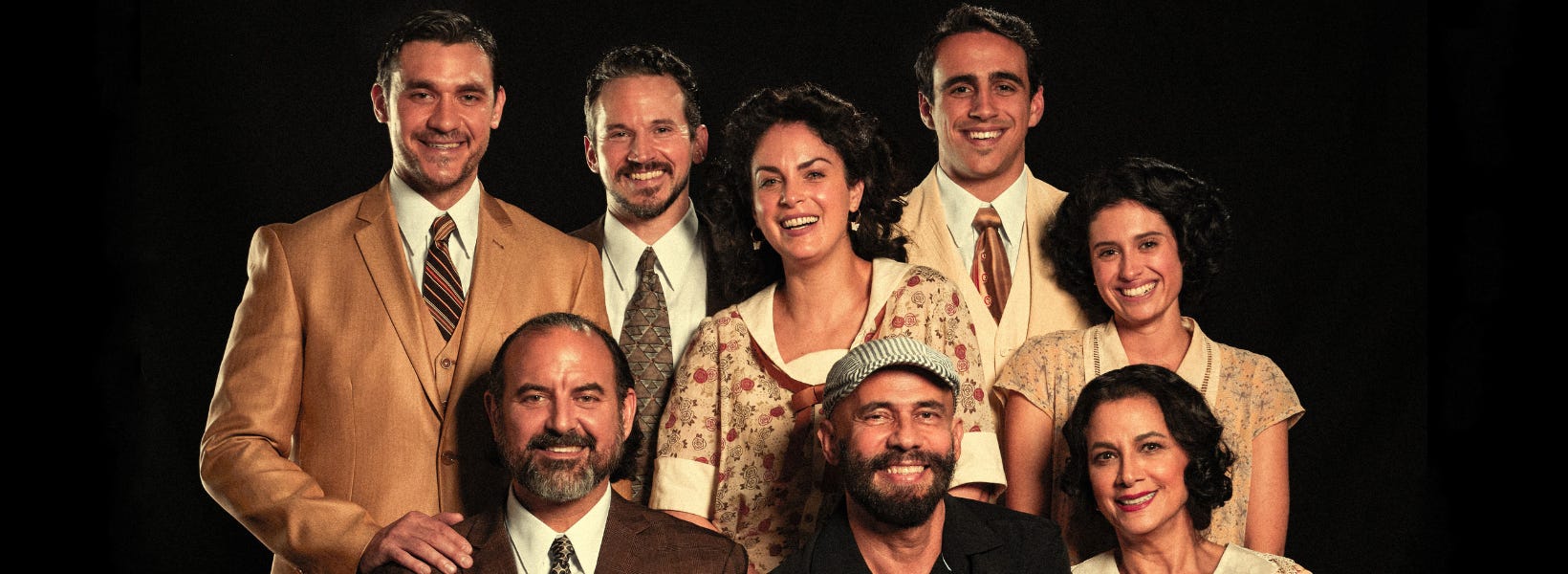
Anna In The Tropics, Miami New Drama, Pictured L-R Top-Bottom, Daniel Capote, Brandon Espinoza, Hannia Guillen, Gabriell Salgado, Andrea Ferro, Serafin Falcon, Nilo Cruz, Saundra Santiago, Photo by Camilo Buitrago Gil
THE SCENE: What you’ve just said about ANNA IN THE TROPICS is absolutely true, you could take these characters, place them in another place other than a cigar factory, at another time, and the story, the character structure, the relationships, the desires, the life of the story would still work. The play is in fact not tied to a cigar factory. Those things add to it and make it more immersive in that specific world where ANNA IN THE TROPICS lives. But the story, the characters, the events could in fact take place somewhere else, and it could be just as moving, because of all those things you just said. The desire for love. For story. For bettering yourself through literature, how connecting to Anna Karenina is such a perfect mirror for them, it works a lot like Shakespeare.
NILO CRUZ: Absolutely. I mean the play is being done, in many places. It’s been done like four times in Russia. I’m sure the fact that it deals with Tolstoy and Anna Karenina help, but I think it’s deeper than that. I think it’s the other characters as well. TROPICS was done at the Stanislavski Theater, and their company of actors came to me and said, ’we want you to write other plays for us,’ which is such an honor that they really connected with the material and beautifully so.
THE SCENE: Because like you said it about the human experience. The really wonderful. What’s next for you?
NILO CRUZ: What’s next for me is to of course to continue writing and directing plays. I’m in the process right now of writing a musical based on a beautiful 1959 film called BLACK ORPHEUS. It’s a French Brazilian film based on Orpheus but set in Brazil, so I’m doing an adaptation of that film into a musical. I actually also just finished doing an opera last November, an opera based on the life of Diego Rivera and Frida Kahlo that premiered in San Diego. It’s going to be presented, in San Francisco at the San Francisco Opera next summer and then in Los Angeles. Opera is one of my newest loves. It’s just amazing because it’s such a large scape. Much of the theatricality that I find that is missing in North American theater you find in opera, it’s just a larger canvas and which offers endless possibilities.
THE SCENE: Thank you for taking the time to speak with The Scene today and congratulations on this 20th Anniversary production.
###
ANNA IN THE TROPICS runs from January 12, 2023, through February 5 at the Colony Theatre (1040 Lincoln Road) in Miami Beach, FL. Performances run Thursdays through Saturdays at 8 pm and Sundays at 3 pm. Tickets ($40 – $70) are on sale at miaminewdrama.org or by calling Miami New Drama’s Box Office at (305) 674 -1040 or email at [email protected].






